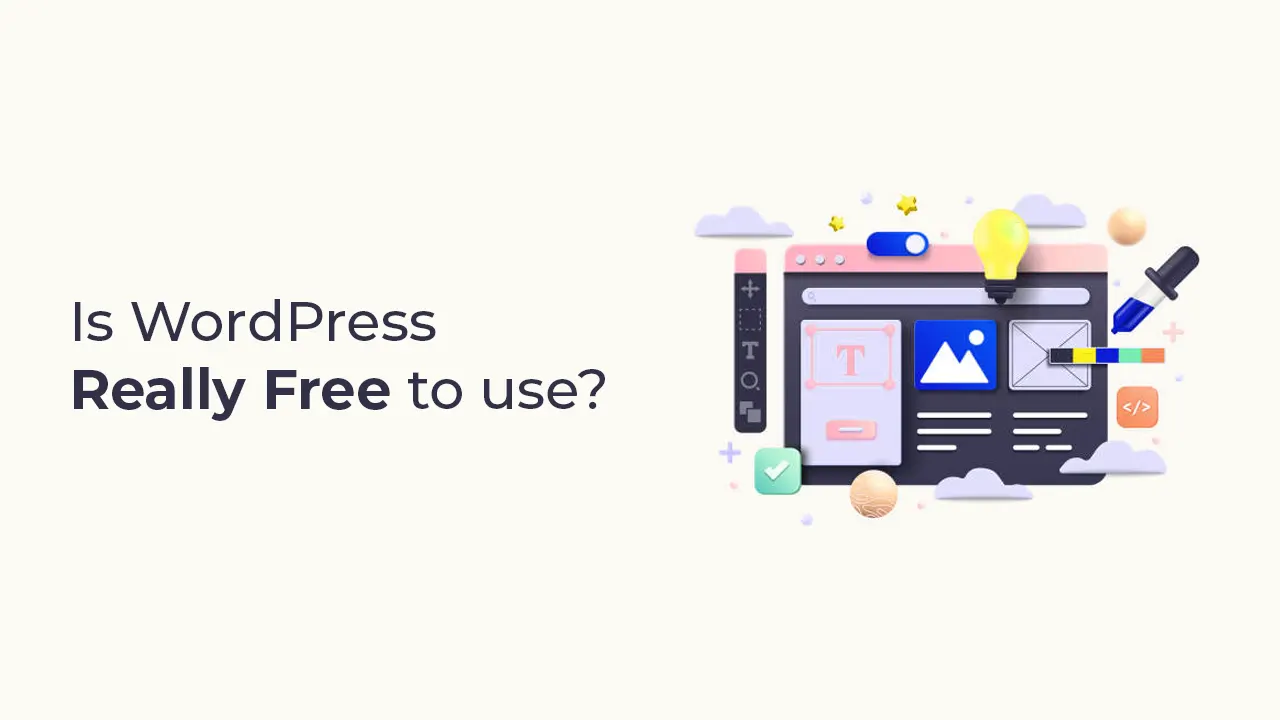Is WordPress free to use?
WordPress is an open-source software, meaning free to use, but domain names, hosting services, and optional premium themes and plugins will incur costs.
There are actually two kinds of WordPress that you have to use, either at WordPress.com or WordPress.org.
But then this powerful website-building platform is how WordPress supports 39 percent of the sites on internet as cited by W3Techs. If, of course you happen to opt for your next site on this site, some of these very preliminary questions that strike in your mind are doable; can it entirely be free?
Indeed, you can use WordPress free of charge. The open-source nature of the service being offered means that this software is free and can be modified as well as widely distributed for public use. This is why a lot of people take up this solution to create their online presence without straining their finances.
You will receive core software along with thousands of free themes and plugins, all for free through WordPress. This helps you customize your website to the fullest without paying a single penny. Moreover, most hosting companies are now offering one-click installations for WordPress, which is even easier. So, there is really no more convenient way to get started than this.
The basic WordPress software is free, but there will be costs in both the construction and maintenance of your website. For example, a unique domain name such as http://www.yourwebsite.com or reliable web hosting services will not be free. Any premium themes, plugins, or professional assistance you choose will add functionality to your website, but they will cost money.
Lastly, and almost importantly, is the other side—the financial investment and the time required to maintain any website or blog built upon WordPress. Although the base installation is free and opens many customization opportunities, the process of developing or building a website tends to require large amounts of time and uses a good deal of resources, either by using your money or by compensating someone else.
This also brings us to another aspect of the view that “free” does not necessarily mean “easy.” While it is indeed user-friendly, navigating it is not akin to a stroll through the park. In instances where a website is very customized or complex, there still is a great learning curve to factor in. You may find yourself spending hours learning WordPress, or perhaps choosing to hire someone else to help you do so. In short, one could say that while WordPress does give the feel of freedom, it is equally important to take a practical approach towards cost and effort. However, if approached correctly and with the right resources, the financial aspect of this very efficient tool for creating an online presence proves to be very cost-effective.
Is WordPress Really Free?
- Core Software: Yes, the core WordPress software is open-source and free to use, modify, and distribute.
- Themes and Plugins: Thousands of free themes and plugins are available to customize your website.
- Web Hosting: Many web hosting providers offer free, one-click installations of WordPress.
WordPress Isn’t Free: Nobody Discuses those Undiscounted Cost End
WordPress is often touted as the ultimate platform for those wanting to have a website. Millions are attracted to its vibrant ecosystem through the promise of “free and open-source.” Let’s forget all the hype and face some contentious truth: WordPress is not really free..
The Illusion of “Free”
Now you hear that WordPress is free. The thing you need to understand about “free” is the reality of the word. Software on WordPress.org is downloadable, installable, and customizable for free. This is where “freedom” becomes costly. It’s the open-source nature of the platform, after all, that leaves all else in your hands: hosting, domain registration, themes, plugins, and security. These aren’t add-ons, but are integral parts to getting a website up and running.
Hosting cost: the first barrier.
First, you have to get a hosting provider to start your WordPress journey. Free hosting exists, but it comes with major restrictions, like bandwidth limits, annoying ads, and unstable uptime. Premium hosting will ensure speed, security, and reliability and will cost between $5 and $50 per month, depending on your needs. If you add this up over a year, it can be hundreds of dollars.
The Price of Customization
One of WordPress’s biggest selling points is its vast library of themes and plugins. While there are free options, they’re often limited in functionality or plagued by outdated code. For a polished, professional website, you’ll likely need premium themes, which can cost anywhere from $30 to $200. Add essential plugins for SEO, e-commerce, or enhanced security, and you’re easily looking at hundreds more annually.
The Hidden Costs of Labour End
Unless you’re a WordPress ninja, you’re probably going to have to contract someone to make sure your website works. Changes, repairs, and general maintenance can be pretty techy, especially when it comes to dealing with the system itself. Freelancers can run up to $20-$100 an hour while agencies will likely bill thousands of dollars for the project. And if you’re doing it all yourself, well, learning how to get it all going took some serious hours in learning.
Security is not inexpensive.
Due to the ubiquitous usage of WordPress, it is a big temptation to hackers. Though a minimal website can afford free security plugins, serious protection is often available only with paid options. The managed WordPress hosting services with built-in security will increase the cost of hosting significantly, but peace of mind is an absolute necessity to keep at.
Ongoing Updates and Care
Keeping a WordPress site current is vital for security and functionality. Themes, plugins, and the WordPress core can have updates that will cause compatibility issues, making it difficult to troubleshoot or needing professional help. This is a continuous maintenance process and often comes with costs.
WordPress is undoubtedly an investment. Although WordPress offers unparalleled flexibility and scalability, the key is to approach it with realistic expectations. After all, the software itself is technically free, but the costs associated with it can rocket quickly, especially for first-time users or businesses seeking advanced functionality.
The Bottom Line WordPress isn’t free—it’s a highly customizable platform with a pay-as-you-go model. The “free” label is misleading, luring users into an ecosystem that requires significant financial and time investments. If you’re considering WordPress, don’t let the promise of zero cost cloud your judgment. Understand what you’re really signing up for, and budget accordingly.


